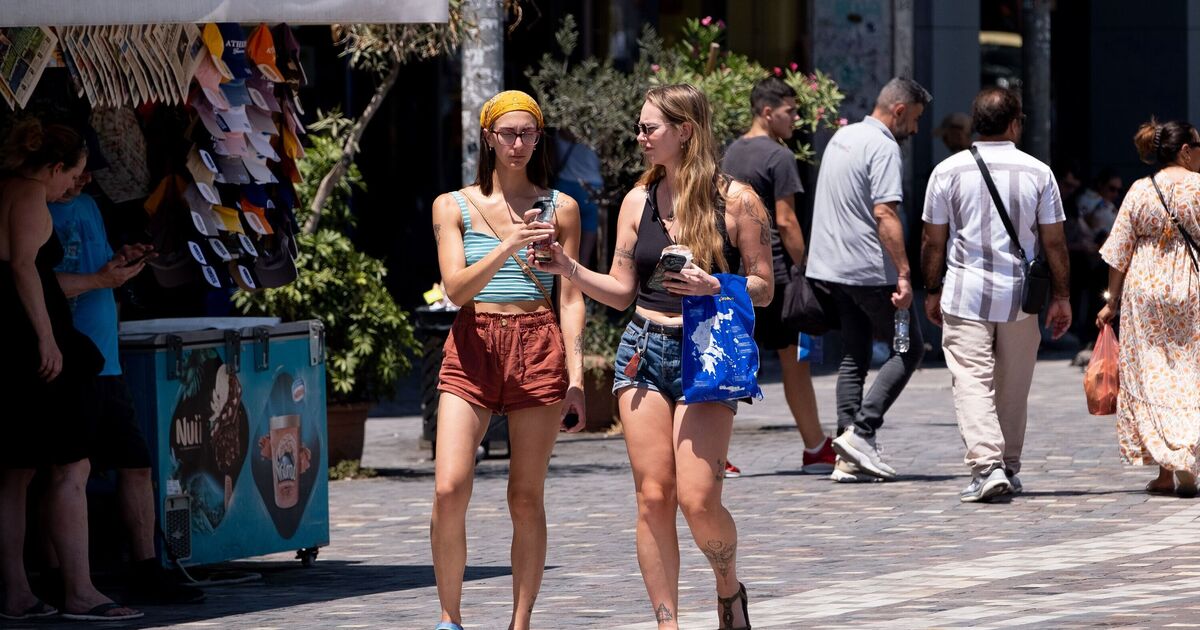

Greece has issued new rules for workers as a heatwave this week is set to hit 44C. The dangerous temperatures are set to last for six days, the country’s National Meteorological Service has said.
Today the Greek Labour Ministry issued a set of rules for people working - imposing mandatory work stoppage and teleworking during the peak hours of the heatwave, in specific regions across the country.
There will be a ban on outdoor work, specifically anything related to manual work, from noon to 5pm. Officials announced a ban on outdoor work, anything related to manual work, such as construction projects, construction sites and deliveries during these hours.
Companies are being asked to provide remote working for employees where possible. Any company allowing the carrying out of the prohibited work will be fined 2,000 euros per employee.
In a tragic incident on Sunday a British tourist was discovered dead on his sun lounger at a popular Greek beach after saying he felt ill. The 74-year-old was found unconscious on Stalis Beach on the island of Crete by fellow resort-goers at around 12pm on Sunday.
Medics from the Hellenic National Centre of Emergency Care (EKAB) treated the man at the scene, though no cause of death has yet been released by Greek authorities.
the lowland areas of the Regional Units of Evros (Soufli area), Serres (Serres area), Larissa (Larissa area), Viotia (Aliartos area), Halkidiki (Polygyros area), Imathia (Veria area), in the Regional Units of Trikala, Fthiotida, Aitoloakarnania, as well as in the Ionian islands, the eastern Rhodes and the coastal areas of the Regional Units of Corinth, Argolida, Arcadia, Laconia and Messinia.
The Notice said: ”It is mandatory to cease work on Monday 21.07.2025, during the period 12.00 to 17.00, in manual work carried out outdoors, such as work on technical and construction projects, construction sites, ship repair zones, distribution and transport of products and objects by two-wheeled vehicle, skateboard, roller skates (delivery), etc.
“In the event that the measure of cessation of distribution operations is applied to delivery businesses, this concerns all businesses that carry out delivery, whether they maintain a physical store or a digital platform, however, the option of ordering with the user receiving it directly from the store/pick-up point (takeaway) may be maintained active, as well as the possible possibility of executing the order with private and public vehicles, except for all types of two-wheelers and mopeds, as defined in the provisions of the Highway Code, provided that they have air conditioning.
“The cessation of operations does not apply to economic activities that concern important and socially critical infrastructure in the sectors of health, transport and public utility (e.g. health units, water supply, electricity, air transport, handling, maritime, land and rail transport), subject to the adoption of the other technical and organizational measures.”
The Acropolos, Greece’s most popular tourist attractions, was closed in early July due to hot weather. It’s not yet confirmed whether that will happen again, but with temperatures set to reach similar heights this week it’s worth keeping a close eye on the official ticket website for all the latest information.
The same thing happened last summer when Greece experienced its earliest-ever heatwave, and you can read all about the working conditions at the Acropolis here.
Much of Europe was gripped by a scorching heatwave in late June and early July, with France, Spain, Portugal, Italy, Türkiye, and Croatia all experiencing extreme temperatures due to a ‘heat dome’ of hot air from North Africa.
This led to wildfires in Crete, İzmir, Marseille and on the outskirts of Madrid, but unfortunately these extreme heat weather events are the ‘new normal’ according to António Guterres, UN chief. Read all about the heatwave in more depth here.